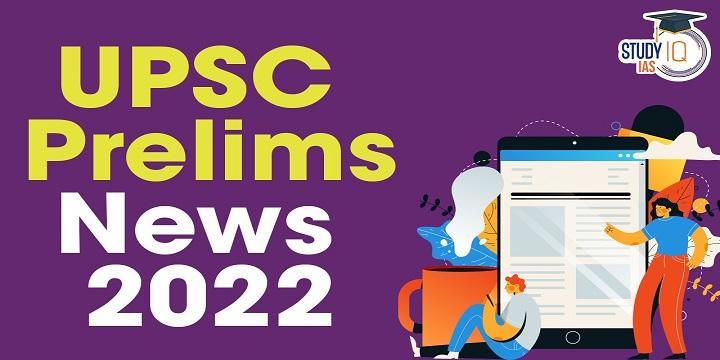UPSC Prelims News of 6 October 2022
Genetically Modified Mosquitoes
Context: Scientists have genetically modified mosquitoes to slow the growth of malaria-causing parasites in their guts.
Working
- These engineered mosquitoes produce compounds which impede the growth of malaria-causing parasites.
- Researchers from the Institute for Disease Modelling at the Bill and Melinda Gates Foundation developed a model to assess the impact of such modifications and found it could be effective even where transmission is high.
- The innovation is so designed that it can be coupled with existing ‘gene drive’ technology.
- Gene drives are self-propagating genetic elements that bias their inheritance so they can spread through populations more rapidly.
- Engineered gene drives have the potential to control pests or disease vectors by spreading deleterious traits, such as sterility, throughout a target population.
- Significance: It can help prevent transmission of the disease to humans.
- If proven in the real world it could offer a powerful new tool to help eliminate malaria.
About Malaria
- It is transmitted between people through a female mosquito after it bites someone infected with the malaria parasite.
- The parasite develops into its next stage in the mosquito’s gut and travels to its salivary glands, ready to infect the next person it bites.
- It is one of the most devastating diseases globally: In 2021, it infected 241 million people and killed 627,000 people.
UPSC Prelims News of 4 October 2022
Pangasius Icaria
Context: Scientists at the National Bureau of Fish Genetic Resources (NBFGR) have discovered a new catfish species of the genus Pangasius, from the river Cauvery.
About Pangasius Icaria
- It has been named after the ICAR as Pangasius Icaria.
- It is known among the local people as Aie Keluthi in Tamil and as Eyegirlu in Karnataka.
- Pangasius catfishes are popular for their commercial value in aquaculture and wild capture fisheries and are considered a delicacy.
- Holotype of it is registered at the National Fish Museum and Repository of the ICAR-NBFGR, Lucknow.
- Latest species is phylogenetically close to Pangasius Silasi.
- Pangasius Silasi was discovered from the Nagarjuna Sagar in River Krishna in 2017.
- A total of 22 species of Pangasius are known from the river basins of Southeast and South Asia.
International Year of Millets (IYOM 2023)
Context: A MoU has been signed between Department of Agriculture and Farmers Welfare and the National Agricultural Cooperative Marketing Federation of India Limited (NAFED) for promoting millets under the International Year of Millets 2023.
More on the News:
- They will build support and organize, market, promote, and forge effective market linkages for millet-based products to boost the value capture and millet-based commodities across the country.
- Millet-based products will be promoted and sold through the network of NAFED Bazaar Stores. Millet-based Vending Machines will be installed at various locations across Delhi-NCR.
International Year of Millets
- The Indian government had proposed to United Nations for declaring 2023 as the International Year of Millets (IYOM).
- The proposal was supported by 72 countries, after which United Nations General Assembly (UNGA) declared 2023 as the International Year of Millets.
- India will celebrate IYOM 2023 as a Peoples’ Movement to provide a global stage for Indian millets, recipes, and value-added products.
Millets:

- Millets are small-seeded annual grasses that are cultivated primarily on marginal lands in dry areas in temperate, subtropical and tropical regions.
- Commonly available millets in India are Ragi (Finger millet), Sama (Little millet), Jowar (Sorghum), Bajra (Pearl millet), and Variga (Proso millet).
- India is the world’s largest producer of millet, accounting for 20 % of global production and 80% of production in Asia.
- India has notified millets as nutri-cereals and included them under the POSHAN Mission Abhiyan.
- Benefits of millets:
- They are source of protein, fiber, key vitamins, and minerals.
- They can grow in arid and less fertile areas and require less fertilizer.
- Millets are climate resilient crops.
Quality Council of India
Context: The year 2022 marks the 25th anniversary of the Quality Council of India (QCI).
About Quality Council of India (QCI)
- Establishment: It was set up in 1997, jointly by the Government of India and the Indian Industry represented by the three premier industry associations i.e. Associated Chambers of Commerce and Industry of India (ASSOCHAM), Confederation of Indian Industry (CII) and Federation of Indian Chambers of Commerce and Industry (FICCI).
- Parent organization: It is an autonomous body attached to the Department of Industrial Policy & Promotion, Ministry of Commerce and Industry.
- Mission: To lead nationwide quality movement in India by involving all stakeholders for emphasis on adherence to quality standards in all spheres of activities primarily for promoting and protecting interests of the nation and its citizens.
- Chairman: The Chairman of QCI is appointed by the Prime Minister on recommendation of the industry to the government.
- Accreditation boards: Over the past 25 years, QCI has created various boards viz- NABL, NABH, NABCB, NABET and NBQP to take over the functions of accreditation and quality promotion.
UPSC Prelims News of 7 October 2022





















 WhatsApp
WhatsApp